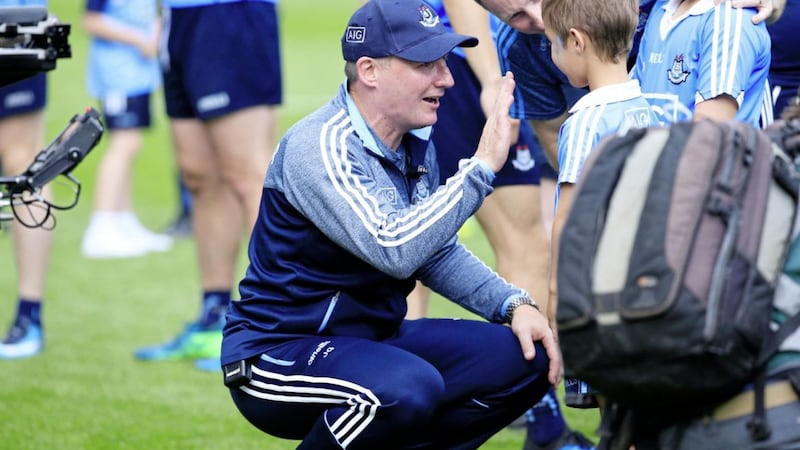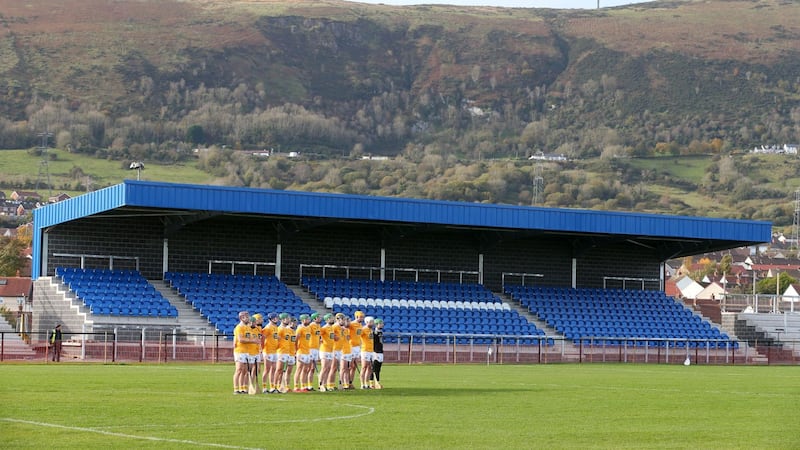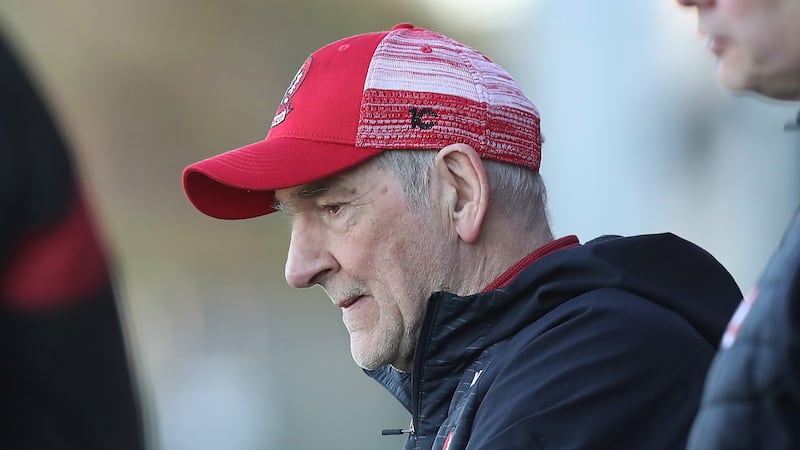“With every manager, they were strong in some areas and weaker in other areas. Tommy [Carr] was a military man, instilled hard work, discipline and definitely developed our character. But did we have the tactical nuance to understand what to do when we were six points up or what to do when we were a few points down? We probably didn’t.”
Jason Sherlock interview with Kieran Shannon, November 2017
*****
THERE are so many small components that make Dublin what they are. The qualities of all champions get magnified by their success, but there was one small act that really summed them up on Sunday.
They’d figured the game out and first-half stoppage time was nearing its end. Cathal McShane carried into a sea of bodies and they turned him over 30 yards from the Dublin goal.
All 15 Dublin players were within 50 yards of their own goal, but Tyrone were exposed themselves at the back.
Eoin Murchan, playing in his first All-Ireland final at the age of 22, was five yards from his own ‘D’ when Philly McMahon stripped McShane.
Murchan took off on what started out as a support run. He hit three-quarter pace in the middle third but as he reached the centre line, he realised there was nobody in blue ahead of him.
So he took off. Full tilt. Sprinted right past three covering Tyrone defenders and got himself in to the full-forward station.
In 14 seconds, he’d gone from beside the turnover in front of his own goal to collecting a pass from Brian Fenton 100 metres away in front of Tyrone’s.
And when he got the ball, there were no head staggers. Didn’t try to take anyone on, didn’t go for a rash shot. Just held the ball up and waited for the support to arrive. Job done.
It was the devastating combination of the awareness to see they needed an outlet, the pace to go there at a full-on 80-metre sprint, and the smarts to know what the right thing to do was when he got the ball.
It was about giving Dublin a shape for their attack, and the selflessness of Murchan to realise he had the legs to go and do it.
And that’s what it really boils down to. The primary reason that Dublin have stayed top of the class over the last two years is that they’ve maintained their fitness levels, and countered the drop in star quality by getting progressively better at making the right decision.
Because of their exceptional conditioning, they will wear everyone bar Mayo into a physical submission. Dublin play on the front foot and it’s exhausting to try and cope with their movement.
Tyrone are in exceptionally good shape themselves, but they’re still physically inferior to Dublin. Only two of the Dublin starting team yesterday is under six foot, compared to six of Tyrone’s.
The reason that Niall Sludden can’t shake Eoin Murchan, or Peter Harte can’t shake John Small, is that the two Dubs can match them for pace, they can match them for power and they can match them for brain.
For two brilliant players whose game is based on athleticism and hard running, they just haven’t been able to get the better of it physically in order to impose their skills on the game.
But this Tyrone team could well have beaten Dublin yesterday had Jim Gavin’s men still been employing even their early post-Donegal-2014 methods.
Of the 21 players they used yesterday, seven were 30 or older, and another three were 28 or 29. The infusion of youth has helped sustain them, but Philly McMahon, Cian O’Sullivan, Kevin McManamon and Michael Darragh Macauley have all shown signs of the inevitable ageing process.
Their tactical adjustments, most notably the relative lack of ball they now kick, is a bow to the fact that without Bernard Brogan and Diarmuid Connolly, with Paul Flynn’s time nearing its end and Eoghan O’Gara not what he was, their attack is no longer as good at winning its own ball.
Yet they’re better now at manufacturing scores than they’ve ever been. The stats back it up.
Their average scores in both Leinster and the All-Ireland series’ have actually increased over the last two years. Even when you remove the outlier against Roscommon from the equation this year, they hit 22 points on average since the start of the Super 8s, beating last year’s 21.7. That was itself an increase on 18.5 (2015) and 18.3 (2016).
How does a team get stronger as an attacking unit while getting weaker in terms of that devastating individual scoring quality, and finding two of its key central defensive components – O’Sullivan and McMahon – having a very average year?
By taking the risk out of the game, they accentuate the quality of their decision making and bring their outstanding conditioning into play. There’s no point being the fittest and fastest in the land if you’re kicking the ball away.
In a superb study last week, Eamon Donoghue of The Irish Times revealed that they hadn’t taken a single shot from outside the 45’ through the entire championship.
They don’t make the right decision 100 per cent of the time, but they do it more often than any other team. Nothing emphasises that better than the fact that they didn’t kick a single wide in the second half on Sunday.
Vincent Walsh, a neuroscientist at University College London who works with elite sports stars to test the limits of their performance, said in a paper in 2016: “It is difficult to think of any human activity that places more demands on the brain (with the possible exception of combat soldier).”
It is the hardest part of any sport to coach. In days of yore, it was simpler: you either had it, or you didn’t.
The man that could read the game could mask his deficiencies. A lack of pace could be countered by an ability to anticipate where and when a ball would be kicked.
Dublin have changed the art form. They’ve masked the losses of key attackers by getting the right men on the ball in the right areas, and trusting those men to do the right thing. More often than not, they do.
That can only be the result of intense, deliberate and effective coaching.
They have bled new players consistently since 2013 but the ones that make it are the ones that prove their smarts as much as their ability.
Whether they’re six points up or a few down now, Dublin find the right answers that they didn’t have when Jason Sherlock was playing.
No team has ever made a Gaelic football pitch look as big.
No team has ever gotten better as a unit while getting weaker individually.
No team has ever been so well coached.
That quality of decision-making across the board is largely man-made, and it’s what continues to set a
team whose individual talents are waning apart from the rest.








